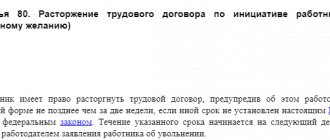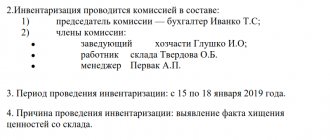Conditions of attack
Who is financially responsible?
Most often it is based on an offense.
Therefore, an explanation is taken from the guilty person - just as in case of disciplinary violations.
In order to bring a person to financial responsibility and force him to compensate for the damage, the elements of the offense must be present.
Without a violation, prosecution is impossible.
For matrimonial liability to occur, 4 mandatory conditions must be met :
- the injured party suffered real (actual) damage;
- the person who caused the damage is really guilty;
- there is a causal connection between the culpable act and the damage caused;
- There are no circumstances that could exempt the culprit from compensation for damage.
Important! Financial liability occurs both after the action and inaction of the culprit . If he did nothing personally, but neglected the opportunity to prevent the damage, he is still considered guilty.
Nuances upon dismissal
Upon termination of the employment relationship, the liability agreement automatically terminates.
The law determines that before terminating an employment relationship, it is advisable to conduct an inventory of property. If the employer neglects such a recommendation, it will be impossible to hold the resigned employee accountable for his actions.
What liability can an employee be held liable for?
A liability agreement can be drawn up with a group of people. In such a situation, when one person is fired, other employees from the team have the right to demand an inventory in order to prevent the risks of financial losses in the form of compensation for damage caused to the company by the actions of the employee with whom the employment contract is terminated.
To prevent an unpleasant situation, each team member must control the quantitative composition of property or monetary assets that are received and transferred during the shift. The employer must take into account that if not only members of the financially responsible group, but also others have access to the values, then holding them fully accountable will be problematic.
Classification
There are several classifications based on various criteria. These criteria allow you to understand the structure of the concept and determine its key features.
According to the subject, financial liability is divided into:
- employee responsibility;
- employer's responsibility.
Based on the number of culprits, it can be:
- individual (1 culprit);
- collective (2 or more culprits).
Depending on the amount of compensation, there are:
- complete (the culprit compensates for all direct actual damage);
- limited (the culprit compensates for damage in an amount no more than his average earnings).
Important! In different situations, determined by law, an employee may have full or limited liability . The employer always bears full financial responsibility, regardless of the situation.
The reimbursement method is also divided into 3 types:
- voluntary (based on a written agreement of the parties);
- based on the order of the employer;
- based on a court decision.
An employee's rights to dismissal on time
An employer’s refusal to dismiss a person at his own request within the time period specified by him is unlawful. The only thing he can require from him is a two-week work period, during which management must have time to conduct a comprehensive property or financial audit. If the procedure is delayed for a longer period, this does not affect the employee’s right to stop working within the period regulated by law, determined by the date specified in the resignation letter or the last day of two-week work.
Subject and object: how to distinguish them?
The subject of material liability is the party to the employment agreement through whose fault the damage occurred . An object is a legal relationship that was violated by a guilty act. In other words, the object of financial liability can be called harm caused to the interests of the victim.
It is also worth separating the subjective and objective sides of the situation.
The subjective side refers to guilt , which characterizes the attitude of the subject (the culprit) to the guilty act and its consequences.
The subjective side may take the form of negligence or intent.
The objective side is a characteristic of the act that occurred, including the causal relationship between the act and the damage, the consequences of the act, as well as other parameters (time, place, method, etc.).
Types of liability
If the operation of property values or finances is entrusted to one person, then the responsibility is individual. If their maintenance is carried out by a group of people and responsibility cannot be divided among each employee, then it is collective.
If work with values is carried out by several employees on different shifts, then their responsibility is individual. It is applied not to a separate value object, but to each employee in terms of handling value. Separate reporting is maintained for each of them in accordance with the formalized positions of the agreement. In the case of collective responsibility, a single document is drawn up, the provisions of which are signed by the entire team.
What laws?
There are several legislative acts that in one way or another affect the issue of financial liability:
- Article 21 of the Labor Code of the Russian Federation. It obliges workers to take care of the property of their employers.
- Articles 22, 212 and 239 of the Labor Code of the Russian Federation. They oblige the employer to create a safe environment for workers and provide them with tools and information on how to carry out work correctly.
- Article 232 of the Labor Code of the Russian Federation. It specifies the mandatory nature of compensation for damage caused. The article places this responsibility on both the employee and the employer. The article also specifies that the reimbursement process must take place in accordance with the law.
- Article 1064 of the Civil Code of the Russian Federation. It talks about the need for full compensation for damage caused to someone’s property. Harm is not only the actual loss, but also the lost benefits of the victim.
- Resolution No. 85 of the Ministry of Labor of the Russian Federation. This resolution contains lists of positions that are subject to financial liability. The document covers both individual and collective financial responsibility.
Mentions of financial liability are also found in other legislative acts of the Russian Federation, but it is those listed above that are considered the main ones .
It is impossible to single out the most important one among them, because in order to resolve the situation with the damage caused, one must be guided by each of the legislative acts.
Attraction to mat. responsibility is one thing. You also need to seek compensation. And for this you need good reasons. One way or another, everything must be spelled out in the employment contract when a responsible person is hired. Positions can be different, ranging from seller, cashier and driver, military personnel and supply manager.
Registration of the contract
The imputation of obligations for which it is possible to subsequently recover damages is carried out in parallel with the signing of the employment agreement. If the imputation of liability was not initially formalized due to the refusal of the employee, whose duties were specified during the interview, with which he agreed by signing the appropriate agreement, then such actions may be regarded as failure to fulfill official duties, which is subject to appropriate punishment provided for in the legislation.
Types of liability
The need to assign responsibility may arise after the start of work. This may be due to the imposition of additional responsibilities, transfer to another position or temporary replacement. The relevance of the procedure may also arise in the event of changes in the lists regulated by the provisions of legal acts.
It is worth noting that an employee has the right to refuse a transfer to a position that involves handling valuables. If he refuses, the employer has the right to dismiss him only after recording a repeated refusal of the offer to work in another workplace. The reason for the rupture of the relationship will be a change in the provisions of the employment contract and the employee’s refusal to continue activities in the new conditions.
Features of compilation
The form of the agreement defining the financial responsibility of the employee is presented in the legal act as a non-standardized sample.
It is advisory in nature and can be supplemented by a number of positions aimed at providing certain guarantees for an employee in a controversial production situation. If the employer, through the provisions of the agreement, violates the rights of the employee or worsens his situation in comparison with the basic parameters, then the agreement may be considered invalid with all the resulting consequences that are clearly unfavorable for management.
List of positions of financially responsible persons according to the Labor Code of the Russian Federation
Articles of the Labor Code of the Russian Federation and Resolution No. 85 of the Ministry of Labor of the Russian Federation determine the lists of positions and works that may be involved in financial liability.
Any employee should carefully read these lists.
Let's consider the list of positions according to the Labor Code of the Russian Federation, which includes MOL:
- Cashiers, controllers of any enterprises. Regardless of the field of activity, these people are always financially responsible.
- The list of MO positions includes employees who work in areas related to deposits, securities trading or finance.
- Workers who work in the expert field.
- Methodologists, laboratory assistants, library staff.
- Managers of pawnshops, lockers, warehouses and other places where someone's property is stored.
- Managers in management positions - storekeepers, wardrobe maids, commandants, forwarders, head nurses.
- The list of positions subject to MO includes managers from the fields of trade, food, service, and hotel business.
- Heads of pharmaceutical companies and pharmacies.
List of works during which MO may occur:
- sale of various goods or services;
- payment and acceptance of payments of any type and form;
- expert works;
- work related to deposits, securities or finance turnover;
- repair work on cars, household items, jewelry, nuclear resources;
- work to ensure the safety of someone's property.
Important! The lists of work with individual and collective financial responsibility are absolutely the same .
We have figured out who is the financially responsible person in the enterprise, let’s move on to the next paragraph of our article.
Registration of financial liability: assignment order and sample agreement
The issue of full financial liability must be fixed in a separate agreement. Only company managers and the chief accountant can have this clause as part of the employment contract.
An agreement on full financial responsibility may be offered to the employee to sign immediately along with the employment contract when he is hired. If this was not done, the employee is liable for damage only within the framework of monthly earnings - even if his position is included in the list of persons with whom agreements on full financial liability can be concluded. The contract itself is concluded on the basis of the relevant order.
The employer may offer to sign the agreement some time after hiring, but the employee is not required to sign it. However, refusal may result in dismissal. However, before this, the employer will have to offer the employee another position. And the dismissal itself is carried out according to a procedure related to a significant change in the terms of the employment contract.
A sample standard contract for such cases was proposed and approved by the Ministry of Labor in the same resolution as the above lists of positions and works. There are 2 options: to consolidate individual and collective responsibility.
In budgetary institutions
Who can be a financially responsible person in a budgetary institution? Such enterprises, like commercial organizations, imply the presence of financially responsible persons. An agreement on full financial responsibility is concluded with them .
It is obvious that budgetary institutions do not have some of the positions from the above list (for example, workers in the depository sector, areas with the circulation of money and securities). Therefore, when talking about financial responsibility in budgetary institutions, we must mean cashiers, storekeepers, wardrobe maids, building superintendents, and warehouse managers.
Financial responsibility: concept
Financial liability refers to the employee’s obligation to compensate for damage caused to the employer as a result of his dishonest behavior. Art. 241 of the Labor Code of the Russian Federation determines that the amount of liability cannot exceed the employee’s average monthly earnings, with the exception of cases regulated by Art. 242 Labor Code of the Russian Federation. This article cites situations where full liability is possible in relation to certain categories of employees included in the list of professions of financially responsible persons. This category may be required to compensate direct actual damage in full. Note: despite the prevailing opinion that the list of financially responsible persons in an organization is determined by its management independently, at the legislative level this issue has clear regulation and no deviations from it are allowed.
With whom is the agreement on full financial responsibility concluded?
It is clear that it is not in any case permissible to impose such obligations on the recipient.
The list, where permissible, is established and limited by law; neither subordinates nor businessmen have the right to somehow vary it at their own discretion.
Such positions are specified in Resolution of the Ministry of Labor No. 85 of December 31, 2002. This is the entire list of positions through whose hands money or other valuables one way or another pass. Consequently, written agreements on full MO are concluded with such employees.
These positions include : heads of departments, heads of laboratories, departments, warehouses, libraries, their deputies, storekeepers, sellers, also cashiers, bank employees, administrators, housekeeping managers, housekeepers, laboratory assistants, heads of pharmacies, head nurses, heads of supply services, commandants, technologists.
There is a special conversation about cashiers in general. The point that causes considerable controversy is whether the cashier-seller can be held accountable for material obligations in full? According to the same 85th Resolution of the Ministry of Labor - yes, this is possible.
The same can be said about accounting employees. Accountants are not mentioned in any way in the 85th Resolution - this is on the one hand. This is understandable; accountants do not work with money directly. But on the other hand, a financier may well be involved in cash transactions.
Should I issue a full MO? The law answers - in this case, yes, formalize (Instruction of the Bank of Russia No. 3210-U dated March 11, 2014, clause 4.2). But again, the degree of obligation for this accountant will be the same as it would be if he were called a cashier.
The category “managers and their deputies” may seem too broad. An agreement may be concluded with them implying property liability only when their responsibilities are directly related to:
- collection or depository activities;
- issuance, maintenance, accounting and storage of bank and discount cards, cash services for people, transactions with valuables.
Another controversial issue is related to the age of workers .
In general, an agreement of this nature is signed only with those who have reached the age of majority.
But minors can also be forced to compensate for the damage caused if they acted intentionally and in a state of alcohol, narcotic or toxic intoxication.
In this case, the employer must take into account factors excluding the liability of the personnel (Article 239 of the Labor Code):
- force majeure circumstances;
- threat to life or health;
- state of necessary defense;
- the employer himself has not created the necessary conditions for the safety of his goods, but requires this from employees;









